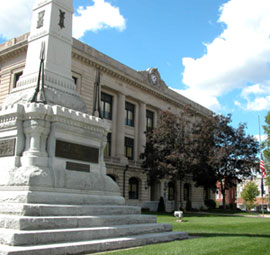Main Content
Article
Involving Others

Carroll County Courthouse
Delphi, IN
Local government can be a significant partner in historic preservation activities. Your community’s elected officials—mayor, city council, county commissioners, township trustees, school boards, to name a few—have many opportunities and avenues to participate in and promote historic preservation activities. Explore and use the tools available in your community to protect historic resources at the local level. Although the federal government is perceived as the having the power to implement preservation-friendly laws, it is actually local government that has the most authority to enact and enforce legislation to protect historic places.
Zoning
Local government provides mechanisms for land use planning, including zoning ordinances and amendments, subdivision proposals, and development projects. Although these usually are not specific to historic properties, local government can adopt historic preservation zoning ordinances.
Preservation Ordinances and Local Historic Designations
Preservation ordinances are local policies enacted to protect properties that a majority of the community agrees are important local history. They also establish criteria for local designations and often enact design guidelines to protect the integrity of historic places and districts.
In most cases, preservation ordinances do not: require private property be accessible to the public; restrict the sale of the property; require approval for repair, maintenance, or interior alterations; require improvements or restoration of a property; or prevent new construction in a historic area. Preservation policies at the local level, while more stringent than federal laws, are better able to reflect the unique nature of the local resources and respond to the priorities of the community. Keeping the enforcement local also allows for more flexibility and adaptability and results in more effective policies that stabilize declining neighborhoods, protect and improve property values, and foster a sense of “ownership” and “stewardship” among the community.
Local Review Boards
Local government can establish review boards to implement preservation ordinances that protect locally designated historic areas.
Local review boards can develop regulations, standards, guidelines, and procedures for complying with a preservation ordinance; designate properties and districts based on local criteria; implement design guidelines; and review proposals for alterations, new construction, and demolition.
Certified Local Governments
Several communities and counties in Indiana have been designated as a “Certified Local Government” (CLG). The designation indicates that a municipality meets certain state and federal qualifications and therefore “certified” to carry out specific regulatory and administrative preservation activities at the local level. To become certified, a city or town must maintain an active and qualified historic preservation commission and commission staff, enforce state and local legislation for the designation and protection of local properties, maintain an up-to-date inventory of historic properties within its jurisdiction, participate in the nomination of local properties to the National Register, and provide for public participation in its meetings and activities.
REMEMBER: local ordinances, historic designations, and review boards are different than the Secretary of the Interior’s Standards, the National and State Registers of Historic Places, and the Indiana Historic Preservation Review Board. Contact your municipal government for information on the local legislation regarding these issues and their effect in your community.
*Source: "Working on the Past In Local Historic Districts", Heritage Preservation Services Division, National Center for Cultural Resources, National Park Service. http://www.nps.gov/tps/education/workingonthepast/index.htm
